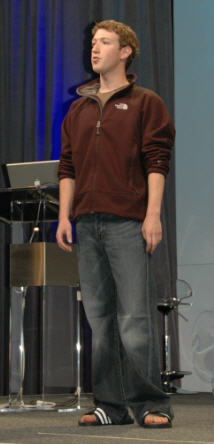 Image via Wikipedia
Image via WikipediaTime Managing Editor Richard Stengel writes:
In a sense, Zuckerberg and Assange are two sides of the same coin. Both express a desire for openness and transparency. While Assange attacks big institutions and governments through involuntary transparency with the goal of disempowering them, Zuckerberg enables individuals to voluntarily share information with the idea of empowering them. Assange sees the world as filled with real and imagined enemies; Zuckerberg sees the world as filled with potential friends. Both have a certain disdain for privacy: in Assange’s case because he feels it allows malevolence to flourish; in Zuckerberg’s case because he sees it as a cultural anachronism, an impediment to a more efficient and open connection between people.There’s not much in the way of new info about Zuckerberg and Facebook in all the materials. It’s pretty much the standard stuff from the great Zuckerberg relatability tour of 2010 after his sweaty meltdown in an April interview with Kara Swisher and Walt Mossberg at D8. (Many mentions of the longtime girlfriend, recounting of childhood pranks, highlights of interests listed in Zuckerberg’s Facebook profile, etc.)
Time profiler Lev Grossman works hard to get to the heart of Zuckerberg (whom he seems to have fallen in love with, just a little). Here are a few of Grossman’s more interesting assessments of how Facebook sprung from the mind of Zuckerberg:
On inspiration:
The reality is that Zuckerberg isn’t alienated, and he isn’t a loner. He’s the opposite. He’s spent his whole life in tight, supportive, intensely connected social environments: first in the bosom of the Zuckerberg family, then in the dorms at Harvard and now at Facebook, where his best friends are his staff, there are no offices and work is awesome. Zuckerberg loves being around people. He didn’t build Facebook so he could have a social life like the rest of us. He built it because he wanted the rest of us to have his.On the big goal:
Facebook wants to populate the wilderness, tame the howling mob and turn the lonely, antisocial world of random chance into a friendly world, a serendipitous world. You’ll be working and living inside a network of people, and you’ll never have to be alone again. The Internet, and the whole world, will feel more like a family, or a college dorm, or an office where your co-workers are also your best friends.On privacy:
Zuckerberg has a talent for understanding how people work, but one urge, the urge to conceal, seems to be foreign to him. Sometimes Facebook makes it harder than it should be. It is biased in favor of sharing. That is, after all, what Facebook is for.Please see the disclosure about Facebook in my ethics statement.
source: http://networkeffect.allthingsd.com/20101215/glassy-eyed-zuckerberg-is-time-person-of-the-year/
